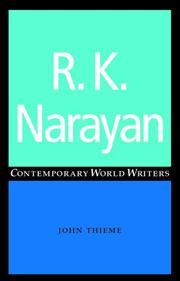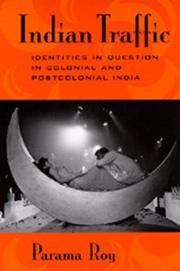| Listing 1 - 6 of 6 |
Sort by
|
Book
ISBN: 0231164556 9780231164559 9780231164542 9780231535595 0231535597 0231164548 9781306311168 1306311160 Year: 2013 Publisher: New York, NY
Abstract | Keywords | Export | Availability | Bookmark
 Loading...
Loading...Choose an application
- Reference Manager
- EndNote
- RefWorks (Direct export to RefWorks)
Reading the life narratives and literary texts of South Asians writing in and about East Africa, Gaurav Desai builds a surprising, alternative history of Africa's experience with slavery, migration, colonialism, nationalism, and globalization. Consulting Afrasian texts that are literary and nonfictional, political and private, he broadens the scope of African and South Asian scholarship and inspires a more nuanced understanding of the Indian Ocean's fertile routes of exchange.Desai shows how the Indian Ocean engendered a number of syncretic identities and shaped the medieval trade routes of the Islamicate empire, the early independence movements galvanized in part by Gandhi's southern African experiences, the invention of new ethnic nationalisms, and the rise of plural, multiethnic African nations. Calling attention to lives and literatures long neglected by traditional scholars, Desai introduces rich, interdisciplinary ways of thinking not only about this specific region but also about the very nature of ethnic history and identity. Traveling from the twelfth century to today, he concludes with a look at contemporary Asian populations in East Africa and their struggle to decide how best to participate in the development and modernization of their postcolonial nations without sacrificing their political autonomy.
Indic literature --- National characteristics, East Indian, in literature --- East African literature (English) --- East Indians --- Asian Indians --- Indians, East --- Indic peoples --- Ethnology --- English literature --- History and criticism --- 891.1 --- 891.1 Indische literatuur --- Indische literatuur --- Littérature indienne (de l'Inde) de langue anglaise --- Caractère national --- Littérature africaine de langue anglaise --- Indiens (de l'Inde) --- National characteristics, East Indian, in literature. --- Histoire et critique. --- Dans la littérature --- History and criticism. --- Dans la littérature. --- Indians (India)
Book
ISBN: 9780230219373 Year: 2010 Publisher: Basingstoke New York : Palgrave Macmillan,
Abstract | Keywords | Export | Availability | Bookmark
 Loading...
Loading...Choose an application
- Reference Manager
- EndNote
- RefWorks (Direct export to RefWorks)
The talk of a catastrophic contemporary environmental crisis is all around us. Yet the relationship between such a crises and literary and cultural forms remains relatively unexamined. This book offers a way to think about this relationship by reading a number of key contemporary Indian novels alongside accounts of the severely stressed ecology and environment of the country. In doing so, postcolonial environments also suggests a new alignment between the theoretical fields of postcolonial and environmental studies. In showing how such an alignment can provide us with a materialist and historicist account of environments of cultures and cultures of environment, the book makes an original contribution to the emergent area of green postcolonialism.
Indic fiction (English) --- Postcolonialism in literature. --- National characteristics, East Indian, in literature. --- Environmentalism in literature. --- History and criticism. --- Indic fiction (English). --- Ecocriticism. --- Englisch. --- Postkolonialismus. --- Roman. --- Literatur. --- Motiv (Literatur). --- Umwelt. --- Roman --- History and criticism --- 1900-2099. --- Indien. --- Littérature postcoloniale --- Roman indien (de l'Inde) de langue anglaise --- Caractère national indien (de l'Inde) --- 1947-.... --- Thèmes, motifs --- Dans la littérature --- Littérature postcoloniale --- Caractère national indien (de l'Inde) --- Dans la littérature --- Thèmes, motifs
Book
ISBN: 9781107040007 9781139626903 9781107732070 1107732077 1139626906 1306376416 9781306376419 1107040000 1107720885 113989305X 1107727960 1107730325 1107728568 1107723957 1316623076 Year: 2013 Publisher: Cambridge New York
Abstract | Keywords | Export | Availability | Bookmark
 Loading...
Loading...Choose an application
- Reference Manager
- EndNote
- RefWorks (Direct export to RefWorks)
During the twentieth century, at the height of the independence movement and after, Indian literary writing in English was entrusted with the task of consolidating the image of a unified, seemingly caste-free, modernising India for consumption both at home and abroad. This led to a critical insistence on the proximity of the national and the literary, which in turn, led to the canonisation of certain writers and themes and the dismissal of others. Examining English anthologies of 'Indian literature', as well as the establishment of the Sahitya Akademi (the national academy of letters) and the work of R. K. Narayan and Mulk Raj Anand among others, Rosemary George exposes the painstaking efforts that went into the elaboration of a 'national literature' in English for independent India even while deliberating the fundamental limitations of using a nation-centric critical framework for reading literary works.
Littérature indienne (de l'Inde) de langue anglaise --- Nationalisme et littérature --- Caractère national --- Identité collective --- Indic literature (English) --- Nationalism and literature --- National characteristics, East Indian, in literature. --- Group identity in literature. --- Histoire et critique. --- Dans la littérature. --- History and criticism. --- History --- Literature and nationalism --- Literature --- Arts and Humanities --- Littérature indienne (de l'Inde) de langue anglaise --- Nationalisme et littérature --- Caractère national --- Identité collective --- Dans la littérature.

ISBN: 1781701245 1847791964 9781847791962 9781781701249 9780719059278 0719059275 9780719059261 0719059267 1847795366 Year: 2007 Publisher: Manchester New York New York Manchester University Press Distributed exclusively in the USA by Palgrave
Abstract | Keywords | Export | Availability | Bookmark
 Loading...
Loading...Choose an application
- Reference Manager
- EndNote
- RefWorks (Direct export to RefWorks)
R.K. Narayan's reputation as one of the founding figures of Indian writing in English is re-examined in this comprehensive study of his fiction, which offers detailed readings of all his novels. Arguing against views that have seen Narayan as a chronicler of "authentic" Indianness, John Thieme locates his fiction in terms of its specific South Indian contexts and cultural geography and its non-Indian intertexts. The study also considers the effect that Narayan's writing for overseas publication had on novels such as Swami and Friends, The Guide and The Man-Eater of Malgudi.Narayan's imaginary
National characteristics, East Indian, in literature. --- Malgudi (India : Imaginary place) --- Imaginary places --- Narayan, R. K., --- Nārāyaṇa, R. K., --- Narayanswami, Rasipuram Krishnaswami --- Narayana Swami, Rasipuram Krishnaswami Iyer, --- Naraĭan, Razipuram Krishnasvami, --- Naraĭan, R. K. --- Narayansawami, Rasipuram Krishnaswamier, --- Nārāyaṇ, Ār. Kē., --- נאראיאן, ר.ק., --- נראיאן, ר. ק., --- Criticism and interpretation. --- India --- In literature. --- Malgudi (India : Imaginary place). --- Literature --- Literary Studies: Post-Colonial Literature --- LITERARY CRITICISM / Asian / Indic --- Indian writing. --- Indianness. --- Malgudi. --- R. K. Narayan. --- cultural geography. --- fiction. --- founding figures. --- inescapability of change. --- modernity. --- non-Indian intertexts.

ISBN: 0520204867 0520204875 0520917685 0585069905 9780520917682 9780585069906 9780520204867 9780520204874 Year: 1998 Publisher: Berkeley University of California Press
Abstract | Keywords | Export | Availability | Bookmark
 Loading...
Loading...Choose an application
- Reference Manager
- EndNote
- RefWorks (Direct export to RefWorks)
The continual, unpredictable, and often violent "traffic" between identities in colonial and postcolonial India is the focus of Parama Roy's stimulating and original book. Mimicry has been commonly recognized as an important colonial model of bourgeois/elite subject formation, and Roy examines its place in the exchanges between South Asian and British, Hindu and Muslim, female and male, and subaltern and elite actors. Roy draws on a variety of sources--religious texts, novels, travelogues, colonial archival documents, and films--making her book genuinely interdisciplinary. She explores the ways in which questions of originality and impersonation function, not just for "western" or "westernized" subjects, but across a range of identities. For example, Roy considers the Englishman's fascination with "going native," an Irishwoman's assumption of Hindu feminine celibacy, Gandhi's impersonation of femininity, and a Muslim actress's emulation of a Hindu/Indian mother goddess. Familiar works by Richard Burton and Kipling are given fresh treatment, as are topics such as the "muscular Hinduism" of Swami Vivekananda. Indian Traffic demonstrates that questions of originality and impersonation are in the forefront of both the colonial and the nationalist discourses of South Asia and are central to the conceptual identity of South Asian postcolonial theory itself.
Indic literature (English) --- British --- Colonies in literature --- Group identity --- National characteristics, East Indian, in literature --- Literature and society --- Anglo-Indian literature --- Postcolonialism in literature --- Postcolonialism --- Group identity in literature --- Nationalism --- Imperialism in literature --- English Literature --- English --- Languages & Literatures --- History and criticism --- History --- #SBIB:39A6 --- #SBIB:39A75 --- Etniciteit / Migratiebeleid en -problemen --- Etnografie: Azië --- Consciousness, National --- Identity, National --- National consciousness --- National identity --- Post-colonialism --- Postcolonial theory --- English literature --- Literature --- Literature and sociology --- Society and literature --- Sociology and literature --- Collective identity --- Community identity --- Cultural identity --- Social identity --- British people --- Britishers --- Britons (British) --- Brits --- Indo-English literature --- Social aspects --- International relations --- Patriotism --- Political science --- Autonomy and independence movements --- Internationalism --- Political messianism --- Decolonization --- Indic literature --- Sociolinguistics --- Identity (Psychology) --- Social psychology --- Collective memory --- Ethnology --- India --- Civilization.
Book
ISBN: 1299242723 0857286471 0857285114 Year: 2013 Publisher: New York : Anthem Press,
Abstract | Keywords | Export | Availability | Bookmark
 Loading...
Loading...Choose an application
- Reference Manager
- EndNote
- RefWorks (Direct export to RefWorks)
The Mahatma Misunderstood is a study of the fiction about Gandhi produced in his lifetime, and explains why novelists both vehemently critiqued and lovingly collaborated with the Mahatma simultaneously.
Indic fiction --- National characteristics, East Indian, in literature. --- Indic literature --- History and criticism. --- Gandhi, --- Aṇṇal Kānti, --- Gāndhi, Em. Ke., --- Gandhi, M. K. --- Gāndhī, Ma. Ka., --- Gāndhī, Mōhanadāsa Karamacanda, --- Gandhi, Mohandas, --- Gandhi, Mohandas K. --- Gandhi, Mohandas Karamchand, --- Gāndhījī, --- Gandi, --- Gandi, M. K. --- Gāndī, Mahātamā, --- Gandi, Mahattŭma, --- Gandi, Mokhandas Karamchand, --- Gandī, Muhandās Kāramchānd, --- Ganji, Mahatoma, --- Ghāndi, --- Ghāndī, Mūhāndās Karamshānd, --- Gkanti, --- Kan-ti, --- Kandi, --- Kānti, --- Kānti, Mōkan̲tās Karamcant, --- Kāntiyaṭikaḷ, --- Mahātmā Gāndhījī, --- Mahātmājī, --- Makātmā Kānti, --- Mōhanadāsa Karamacanda Gāndhī, --- Mōkan̲tās Karamcant Kānti, --- גאנדי, מ.ק --- גאנדי, --- גנדהי, --- مهاتما گاندهى --- گاندهى، مهاتما --- گاندى، مهاتما --- گاندى، مهنداس کارمچاند --- گاندھى، --- In literature.
| Listing 1 - 6 of 6 |
Sort by
|

 Search
Search Feedback
Feedback About UniCat
About UniCat  Help
Help News
News